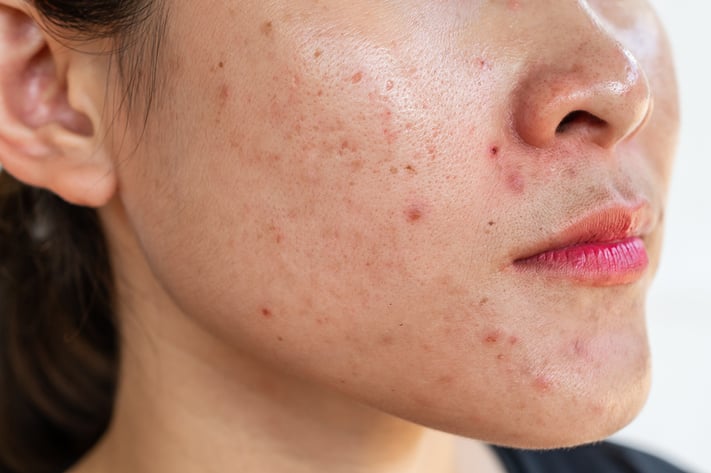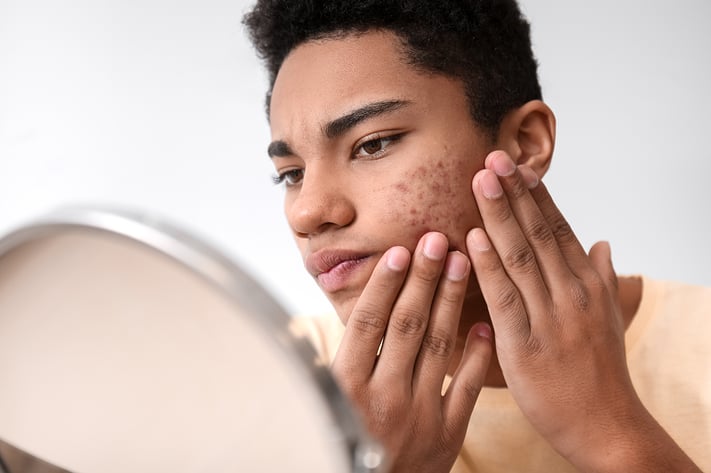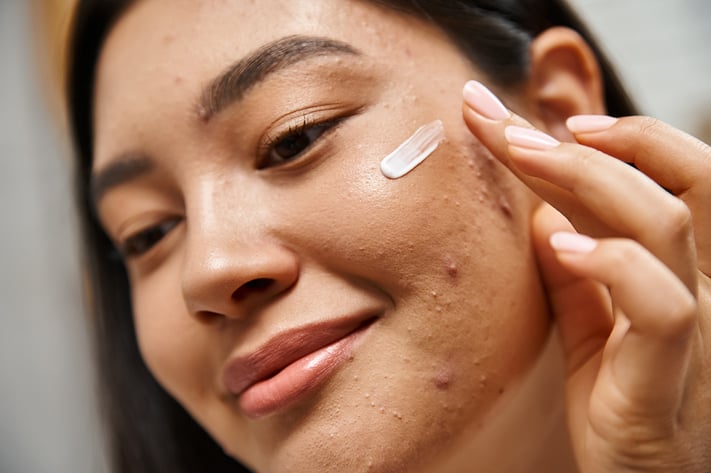
It’s natural to feel overwhelmed when dealing with inflamed acne, but taking small, consistent steps can lead to significant improvements. By understanding the causes of your breakouts, managing acne can become easier and less stressful for you.
Below is your guide to the root causes behind these inflamed breakouts—with proven acne-fighting strategies and products to promote healthier, clearer skin.
WHAT IS INFLAMMATORY ACNE?
Inflammatory acne is a skin condition that consists of red, swollen and painful lesions. These develop when your pores become deeply clogged by oil, bacteria and dead skin cells. When such clogged pores rupture, the bacteria inside them spread to the surrounding skin, triggering an immune response that causes inflammation, redness and swelling. This inflammatory reaction can then aggravate pre-existing acne, creating a continuous cycle of irritation.
INFLAMMATORY VS NON-INFLAMMATORY ACNE
Acne can be classified into two categories: inflammatory and non-inflammatory, based on the characteristics of the lesions. Non-inflamed acne isn’t red or swollen, and often remains at the skin’s surface, whereas inflamed acne is deeper in the skin, resulting in sore, red bumps that can also contain pus.
Knowing the difference between inflamed versus non-inflamed acne can allow you to successfully target your breakouts. Managing your acne can become more attainable with the right ingredients.

TYPES OF INFLAMMATORY ACNE
Not all inflammatory acne is the same; each type has different characteristics. Below is a quick look at the four main types of inflamed acne:
- Papules: Small, red, raised bumps that are tender but don’t have visible pus. Papules occur when the follicle walls rupture, causing swelling and redness within the clogged pores.
- Pustules: Bumps that have a pus-filled center, often surrounded by red, inflamed skin. These classic “pimples” result when white blood cells collect and form pus at the surface of the skin.
- Nodules: Large, hard and often painful lumps deep beneath the surface of the skin. They occur when infected material spreads due to a deep rupture of the follicle wall.
- Cysts: The most severe type, cysts are characterized as large, soft, painful, fluid-filled lumps deep in the skin. Cystic acne can be beyond the scope of an esthetician’s practice (depending on the state and licensure), so you may need to visit a dermatologist to best control this acne type.
CAUSES
Understanding the several underlying factors of inflamed acne is the first step toward clearer skin. Let’s explore the common causes of your breakouts—from clogged pores to hormonal fluctuations—to effectively reduce these impurities.
Excess Oil Production
Your skin naturally produces oil, known as sebum, for healthy skin. However, an excessive amount of sebum production can lead to clogged pores, creating the ideal environment for breakouts to occur.
Dead Skin Buildup
When dead skin cells are not naturally shed, they can pile up in your pores. This accumulation traps bacteria and oil, leading to inflammation and resulting in redness and swelling.
Bacterial Overgrowth
Propionibacterium acnes, a skin bacterium, thrives in clogged pores. When too much oil is built up, the bacteria break it down and produce irritating fatty acids that lead to inflamed breakouts.
The Body’s Immune Response
When your immune system recognizes harmful bacteria, it sends white blood cells to fight them off. This process can cause redness and swelling associated with inflamed acne.
Hormonal Imbalances
Hormonal changes boost sebum production, which can lead to clogged pores and acne breakouts. Whether hormone levels shift due to puberty, stress or menstruation, inflamed acne is more likely to occur.
External Factors
Your diet, hygiene, makeup and exposure to pollutants can all contribute to acne flare-ups. By incorporating daily habits like cleansing your skin, eating a balanced diet and using makeup products that don’t clog your pores, you can help minimize the harmful effects these factors may have on your skin.

PREVENTING & MANAGING INFLAMMATORY ACNE
Managing inflamed acne can be difficult, but not impossible. With the correct skin hygiene habits, you can reduce inflammatory breakouts and promote clearer skin. Some proven solutions to prevent acne include:- Washing your face morning and night: Using an acne-safe cleanser, like our Clear Skin Cleanser, you can target and kill acne-causing bacteria. Cleaning your skin daily to clear harmful bacteria is a crucial step in your skincare routine.
- Avoid touching your skin: When you touch or pick at your skin, you are causing the bacteria to spread—worsening inflammation and increasing your chances of scarring.
- Use acne-safe makeup products: Look for products that are non-comedogenic and oil-free to avoid clogging pores.
- Use high-quality skincare: Your skincare routine plays a vital role when it comes to combating acne. By applying professional skincare with acne-fighting ingredients—like Benzoyl Peroxide, Salicylic Acid and Retinol—you can reduce and prevent acne breakouts.
By addressing your skin condition head-on, you can achieve amazing results using GlyMed’s unmatched skincare. Our pharmaceutical-grade products are made to actively target acne and give you the healthy skin you strive for.
GlyMed Plus carries a variety of products proven to reduce and manage inflammatory acne. Below are before and after photos, showing the results of consistency and the right products in your home care routine.

TOP SKINCARE PRODUCTS FOR INFLAMMATORY ACNE
Don’t know where to start? Here are some of our customers’ favorites for managing inflamed acne:
- Astringent No. 2: Powered by Salicylic Acid, this serum dries up acne, kills bacteria, reduces redness and controls excess oil production.
- Blemish Control No. 5: One of the most effective topical treatments for inflamed acne, it utilizes Benzoyl Peroxide to reduce bacteria and clear acne breakouts.
- Daily Skin Clarifier: This powerful antioxidant reduces discolorations associated with acne, helping brighten the skin and decreasing signs of hyperpigmentation caused by inflammatory acne.
- Serious Action Masque: Containing Glycolic, Lactic and Salicylic Acid, this acne-fighting masque purges impurities from the skin, dramatically reducing acne lesions.
- Daily Repair Cream: This lightweight formula restores damaged and stressed skin while fighting acne-causing bacteria. It’s our number one moisturizer, made to rejuvenate and protect the skin.
Maintaining clear skin can be difficult, but with the right products and routine, you can effectively prevent inflammatory breakouts. GlyMed has professionals around the country ready to help you create the ideal skincare regimen for your acne-prone skin. Reach out to your nearest GlyMed Pro today to begin your journey toward clearer skin.
LG_Final-@2x(322x60).png?width=322&height=60&name=GlyMed-Logo(Black)LG_Final-@2x(322x60).png)